 The logarithm of a number is the exponent of the power to which it is necessary to raise a fixed number, in order to produce the first number. The logarithm of a number is the exponent of the power to which it is necessary to raise a fixed number, in order to produce the first number.  A Treatise on Algebra - Page 284by Elias Loomis - 1873 - 360 pagesFull view A Treatise on Algebra - Page 284by Elias Loomis - 1873 - 360 pagesFull view - About this book
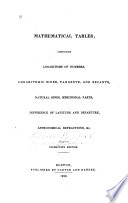 | Solomon Pearson Miles - Logarithms - 1830 - 100 pages
...1830. INTRODUCTION. OF LOGARITHMS. THE LOGARITHMS of numbers are the exponents of the different powers to which a constant number must be raised, in order to be equal to those numbers ; the principles, therefore, which apply to exponents in general, apply to logarithms.... | |
 | Encyclopaedia Americana - 1831 - 610 pages
...proportion, and арв^, number). " The logarithms of numbers are the exponents of the different powers to which a constant number must be raised, in order to be equal to those numbers ; the principles, therefore, which apply to exponents in general, apply to logarithms."... | |
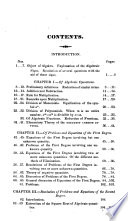 | Bourdon (M., Louis Pierre Marie) - Algebra - 1831 - 446 pages
...raise an'tnvariable number, to form all these numbers, an idea will be had cf a table of logarithms. The logarithm of a number, is the exponent of the power, to which it is necessary to raisj a certain invariable number, in order to produce the first number. The invariable... | |
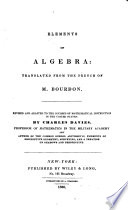 | Charles Davies - Algebra - 1835 - 378 pages
...invariable number, to form all these numbers, an idea will be had of a table of logarithms. Hence, The logarithm of a number, is the exponent of the power to which it is necessary to raise a certain invariable number, in order to produce thefirst number. Any number,... | |
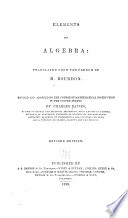 | Algebra - 1838 - 372 pages
...invariable number, to form all these numbers, an idea will be had of a table of logarithms, Hence, The logarithm of a number, is the exponent of the power to which it is necessary to raise a certain invariable number, in order to produce thefrst number. Any number,... | |
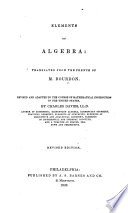 | Charles Davies - Algebra - 1842 - 368 pages
...invariable number, to form all these numbers, an idea will be had of a table of logarithms. Hence, The logarithm of a number, is the exponent of the power to which it is necessary to raise a certain invariable number, in order to produce thefirst number. Any number,... | |
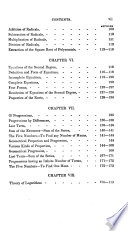 | Charles Davies - Algebra - 1842 - 284 pages
...by Jlf, a"=M Thus, if we make m=0, M will be equal to 1; if wi=l, M will be equal to 10, &.C. Hence, The logarithm of a number is the exponent of the power to which it is necessary to raise the base of the system in order to produce the number. 1 76. Letting, as before,... | |
 | Thomas Sherwin - Algebra - 1842 - 326 pages
...Tables of logarithms in common use, are constructed upon the number 10 as a base. Hence, The common logarithm of a number, is the exponent of the power to which 10 must be raised, in order to produce that number. Thus, 3 is the logarithm of 1000, because 103 =... | |
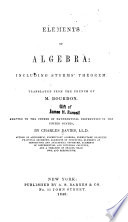 | Charles Davies - Algebra - 1845 - 382 pages
...of that number ; and the invariable number a is called the bose of that system of logarithms. Hence, The logarithm of a number, is the exponent of the power to which it is necessary to raise an invariable number, called the base of the system, in order to produce the... | |
| |